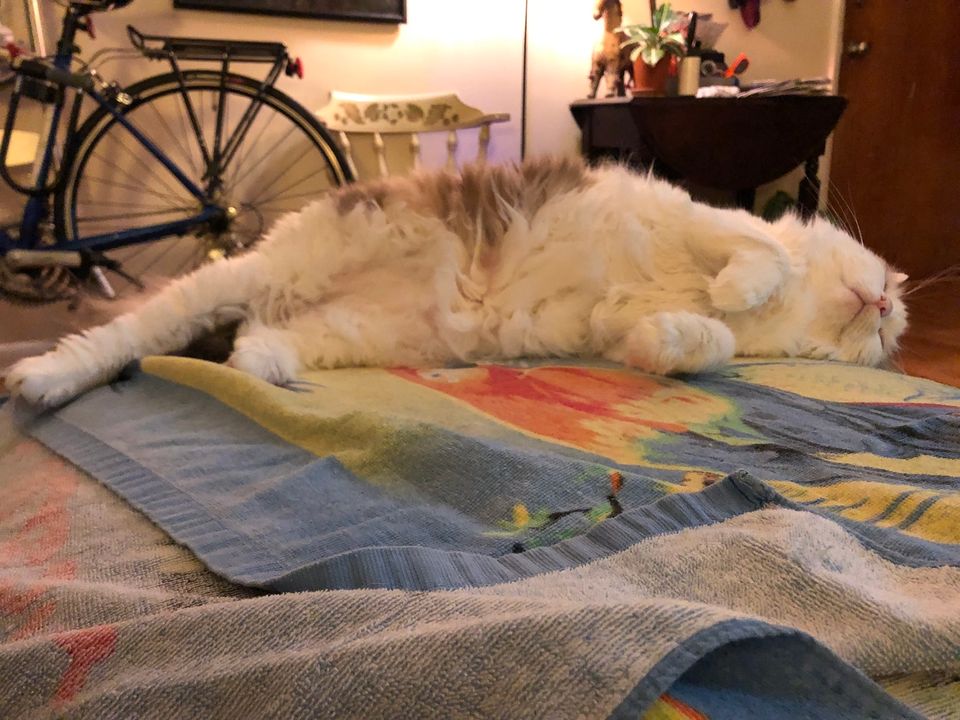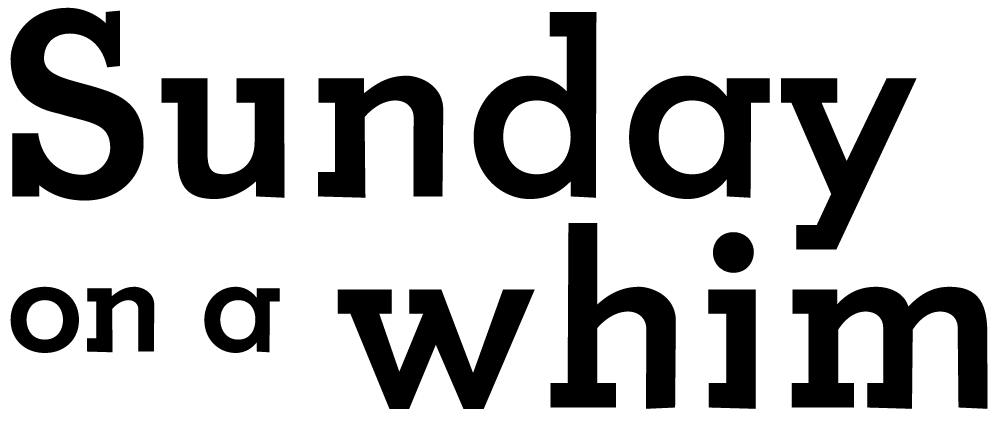Why I started a newsletter

February 17, 2019
Dear chosen family,
Welcome to the very first edition of Sundays on a Whim, my newsletter for writing about life as it happens. Let’s lay out a few ground rules.
1. This will probably seem unvarnished at times.
At least as I begin it now, this newsletter is in part a response to my grief. Those of you that have lost loved ones understand that this particular type of loss can be complicated and unpredictable. And while I’ll do my darndest to deliver clarity, part of what will keep this newsletter going will be the psychological safety of the space—knowing that I can fill it out with half-thoughts and unexplored feelings from time to time.
2. It won’t be me, me, me every week.
I’m going to write about more than myself. This won’t be a set of weekly monologues in place of talking therapy—I’ve been seeing the same therapist for three years now and he’s the best.
3. I’ll always include recommendations.
With the platforms and AIs out there trying to guess what we’d like to read or watch next, I find that I’m making almost all of my choices based on recommendations from friends or other writers.
4. You can and should participate.
Another reason for starting this newsletter is to keep in touch. A few of you already wrote back to my first invite with little updates and comments and that’s really what this is about. I didn’t kick this off to yell into the void. Please do respond with your thoughts, your own news, and whatever strikes your fancy. I’d love to hear from you.
On to this week’s letter.
Why I Am I Writing This? How Did I Get Here?
Imitation is the highest form of flattery. Good artists borrow, great ones steal.
Banal stuff.
I’ve written this idea off more times than I can count. For years, I wanted to write beautiful original stuff, spun from cloth of my own without the help of others. Derivative meant bad. My naive sense of glory manifested itself in a vision in which I’d be routinely struck by inspiration that would flow effortlessly out of my fingers and onto the page.
This image of myself as a writer blatantly ignored the talents I actually displayed and practiced. From a very early age, I was a copycat. Reciting entire scenes from movies with friends, devouring novels, re-telling jokes I’d overheard the guys at my dad’s poker tell each other on late Friday evenings (those got me in trouble), squawking my way through a Monty Python song with my mom—I have always loved absorbing memorable stuff and sharing it with other people, often with a self-gratifying wink that says, “Isn’t it awesome that I remembered this?”
And though it ran counter to my teenage notions about what it meant to be a writer (banging away at a laptop on a writing desk with the door closed and a body of water outside the windows providing the tranquility necessary for my creative process), that copycat was just the sort of person to help me get started writing. Of course the numerous voices in the books and magazines I read would show themselves in anything I sat down to write myself, and yet I found myself a twenty-something defeatist—deleting any piece I started because it didn’t sound original enough.
At some point between the fall of 2014 and 2015, I was forced to give up the imaginary writer in my head who didn’t borrow from others. It was a necessity. It was my first year writing for Ultiworld and I had deadlines. There were other people on staff (people who inspire me to this day) who I thought were doing it better than me. They were more careful with their diction, their metaphors were inventive, and most importantly: their sentences were a lot shorter. I gave in and started emulating.
To the surprise of probably no one other than myself, it worked. Once I started trying out techniques from fellow Ultiworld writers, I couldn’t stop scouring more journalism and trying on different voices like a rack of ridiculous thrift store finds that might eventually form the perfect costume. Reading became an excuse to improve my writing, not just a way to marvel at the carefully constructed craft of my heroes and influences.
So it should come as no surprise that this newsletter is a result of my being a copycat. At least as we kick off this writing space, this is both an exercise of my own voice and an imitation of Anne Helen Petersen, a Missoula-based Senior Culture Writer for Buzzfeed News.
Petersen came across my radar last month, when she published her article How Millenials Became the Burnout Generation, a piece that punched me so hard in the gut I couldn’t stop talking about it for weeks. As I dove into Petersen’s presence on Twitter—where she openly communicates with her audience and joins the Twittersphere in offering sardonic armchair commentary about anything and everything trending—I found her newsletter, which she writes once a week on this very same platform. (Ask me how I chose this.) It was the same incisive mind behind the well-reported articles, but more vulnerable and unfinished. Confessional to the point that she expresses doubt and fear, but not of putting her voice out in the world.
Not that Petersen is the first journalist to take up a email newsletter. Axios, the post-modern bulleted-list news media outlet, has almost all of its editors writing newsletters. I’ve been reading Tom Ziller’s Good Morning It’s Basketballsince 2012 or 2013. And as journalism continues to externalize its reckoning with itself as an industry, many reputable writers have taken to platforms like this one to charge small monthly fees for a source of steady income. (This one will stay free, at least until it becomes some sort of creative nonfiction critical darling. Okay, you can un-roll your eyes now.)
But Petersen did provide the spark necessary to get me to start here. I feel a kinship with her approach and perspective. So I admit to following her lead as a means to begin my own journey forward. Maybe she’d be flattered. She might tell me to get over myself.
Media of the Moment
What Miche and I are Watching
Counterpart Season II (Starz, via Amazon Prime); J.K. Simmons as a fearful automaton at a shadowy government agency that’s protecting a big honking secret. Think highbrow Fringe.
True Detective Season III (HBO)—two episodes left! This season doesn’t quite have the magical realism of the brilliantly directed Season I (shouts to Cari Joji Fukanaga, also of Atlanta), but it does have a compelling mystery and another masterful on-screen turn from Mahershala Ali. Plus, Stephen Dorf! Remember him as a vampire in Blade? Warning: lots of mumbling. We unabashedly pause and rewind as necessary.
Sunderland ‘Til I Die (Netflix)—an awesome documentary series about the English football club’s first season after relegation in 2017. We watch this one with the subtitles on. Those UK dialects are tough to pick apart in real time.
And on my own: The Expanse, Season III (Amazon); some of the better sci-fi world-building on TV, although the interpersonal relationships are boring and poorly written. Watch for the political maneuvering and the blatant parallels to imperialism, not for the the love interests or the weird execution of Belter accents (like a cross between someone from the Ozarks and someone whose first language is Afrikaans).
Next up: Russian Doll (Netflix)? I hear it’s excellent.
Journalism I liked this week
Anne Helen Petersen’s strong and depressing follow up to the Burnout piece: Here’s Why So Many Americans Feel Cheated By Their Student Loans (Buzzfeed)
Ian Parker’s excellent, winding profile of debut author Dan Mallory, A Suspense Novelist’s Trail Of Deceptions (The New Yorker)
What’s on my nightstand
Dennis Johnson’s Tree of Smoke (2007), winner of that year’s National Book Award
Michelle Obama’s Becoming (2018), which I’m reading in chunks because it’s emotionally heavy and beautiful.
And finally, I said I’d link the poem from which this newsletter takes its current name. Here’s Richard Hugo’s Degrees of Gray In Philipsburg.
Record or song of the week
Kacey Musgraves’s Grammy-winning Golden Hour. The name only sort of rang a bell until she won last week, and now we’re spinning the heck out of her airy, psychedelic-ish country record.
That’s all for this week. I’ve shared this with a large batch of folks, but please do forward it to other friends and family who’d like to keep in touch.
Simon
P.S. Thank you to all of you who’ve sent cards to Miche and I—we’ve read them all. And we are delighted weekly in the notices we’ve received when folks have made donations in Mom’s memory.
